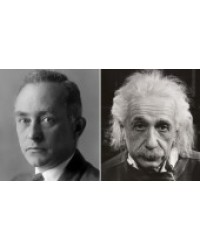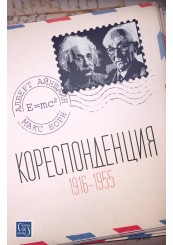Albert Einstein & Max Born

Albert Einstein (1879–1955) was a German-born theoretical physicist who developed the theory of relativity, one of the two pillars of modern physics (alongside quantum mechanics). His work is also known for its influence on the philosophy of science. He is best known to the general public for his mass–energy equivalence formula, which has been dubbed "the world's most famous equation". He received the 1921 Nobel Prize in Physics "for his services to theoretical physics, and especially for his discovery of the law of the photoelectric effect", a pivotal step in the development of quantum theory.
Near the beginning of his career, Einstein thought that Newtonian mechanics was no longer enough to reconcile the laws of classical mechanics with the laws of the electromagnetic field. This led him to develop his special theory of relativity during his time at the Swiss Patent Office in Bern (1902–1909). However, he realized that the principle of relativity could also be extended to gravitational fields, and he published a paper on general relativity in 1916 with his theory of gravitation. He continued to deal with problems of statistical mechanics and quantum theory, which led to his explanations of particle theory and the motion of molecules. He also investigated the thermal properties of light which laid the foundation of the photon theory of light. In 1917, he applied the general theory of relativity to model the structure of the universe.
Except for one year in Prague, Einstein lived in Switzerland between 1895 and 1914, during which time he renounced his German citizenship in 1896, then received his academic diploma from the Swiss federal polytechnic school (later the Eidgenössische Technische Hochschule, ETH) in Zürich in 1900. After being stateless for more than five years, he acquired Swiss citizenship in 1901, which he kept for the rest of his life. In 1905, he was awarded a PhD by the University of Zurich. The same year, he published four groundbreaking papers during his renowned annus mirabilis (miracle year) which brought him to the notice of the academic world at the age of 26. Einstein taught theoretical physics at Zurich between 1912 and 1914, before he left for Berlin, where he was elected to the Prussian Academy of Sciences.
In 1933, while Einstein was visiting the United States, Adolf Hitler came to power. Because of his Jewish background, Einstein did not return to Germany. He settled in the United States and became an American citizen in 1940. On the eve of World War II, he endorsed a letter to President Franklin D. Roosevelt alerting him to the potential development of "extremely powerful bombs of a new type" and recommending that the US begin similar research. This eventually led to the Manhattan Project. Einstein supported the Allies, but he generally denounced the idea of using nuclear fission as a weapon. He signed the Russell–Einstein Manifesto with British philosopher Bertrand Russell, which highlighted the danger of nuclear weapons. He was affiliated with the Institute for Advanced Study in Princeton, New Jersey, until his death in 1955.
Einstein published more than 300 scientific papers and more than 150 non-scientific works. His intellectual achievements and originality have made the word "Einstein" synonymous with "genius". Eugene Wigner wrote of Einstein in comparison to his contemporaries that "Einstein's understanding was deeper even than Jancsi von Neumann's. His mind was both more penetrating and more original than von Neumann's. And that is a very remarkable statement."
Max Born (1882–1970) was a German-Jewish physicist and mathematician who was instrumental in the development of quantum mechanics. He also made contributions to solid-state physics and optics and supervised the work of a number of notable physicists in the 1920s and 1930s. Born won the 1954 Nobel Prize in Physics for his "fundamental research in quantum mechanics, especially in the statistical interpretation of the wave function".
Born entered the University of Göttingen in 1904, where he found the three renowned mathematicians Felix Klein, David Hilbert, and Hermann Minkowski. He wrote his Ph.D. thesis on the subject of "Stability of Elastica in a Plane and Space", winning the University's Philosophy Faculty Prize. In 1905, he began researching special relativity with Minkowski, and subsequently wrote his habilitation thesis on the Thomson model of the atom. A chance meeting with Fritz Haber in Berlin in 1918 led to discussion of the manner in which an ionic compound is formed when a metal reacts with a halogen, which is today known as the Born–Haber cycle.
In the First World War, after originally being placed as a radio operator, he was moved to research duties regarding sound ranging due to his specialist knowledge. In 1921, Born returned to Göttingen, arranging another chair for his long-time friend and colleague James Franck. Under Born, Göttingen became one of the world's foremost centres for physics. In 1925, Born and Werner Heisenberg formulated the matrix mechanics representation of quantum mechanics. The following year, he formulated the now-standard interpretation of the probability density function in the Schrödinger equation, for which he was awarded the Nobel Prize in 1954. His influence extended far beyond his own research. Max Delbrück, Siegfried Flügge, Friedrich Hund, Pascual Jordan, Maria Goeppert-Mayer, Lothar Wolfgang Nordheim, Robert Oppenheimer, and Victor Weisskopf all received their Ph.D. degrees under Born at Göttingen, and his assistants included Enrico Fermi, Werner Heisenberg, Gerhard Herzberg, Friedrich Hund, Pascual Jordan, Wolfgang Pauli, Léon Rosenfeld, Edward Teller, and Eugene Wigner.
In January 1933, the Nazi Party came to power in Germany, and Born, who was Jewish, was suspended from his professorship at the University of Göttingen. He emigrated to the United Kingdom, where he took a job at St John's College, Cambridge, and wrote a popular science book, The Restless Universe, as well as Atomic Physics, which soon became a standard textbook. In October 1936, he became the Tait Professor of Natural Philosophy at the University of Edinburgh, where, working with German-born assistants E. Walter Kellermann and Klaus Fuchs, he continued his research into physics. Born became a naturalised British subject on 31 August 1939, one day before World War II broke out in Europe. He remained at Edinburgh until 1952. He retired to Bad Pyrmont, in West Germany, and died in hospital in Göttingen on 5 January 1970.


